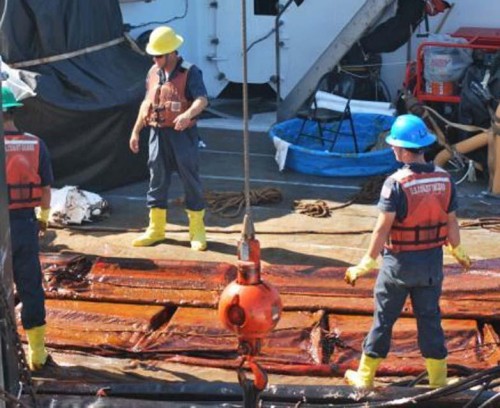Tuesday, July 13
July 13, 2010Ellis Warren Jr.
July 15, 2010After being shot down for a second time in court, the Obama administration issued a second moratorium on Monday.
The second version on the drilling ban will not be specific to any drilling depths, and the moratorium reportedly cites new evidence of safety concerns with drilling.
“I am basing my decision on evidence that grows every day of the industry’s inability in the deep water to contain a catastrophic blowout, respond to an oil spill, and to operate safely,” said Secretary of the Interior Ken Salazar.
The decision comes after the original moratorium was struck again struck down in court for the second time.
Shortly after 30 minutes of oral arguments from both sides of the Hornbeck v. Salazar case, the U.S. Government’s motion for stay was denied in the Court of Appeals on Thursday, July 8 by a three-judge panel including Judge Jerry E. Smith, Judge W. Eugene Davis and Judge James L. Dennis.
But drill workers won’t be jumping back on rigs right away, for fear they may or may not be shut down again.
“We’re pleased the court did not reinstate the moratorium. However, it’s clear from the ruling that this matter is not resolved and there remains uncertainty about the future of deepwater drilling and thousands of jobs in our state,” said Gov. Bobby Jindal, who was present in the courtroom during the hearing.
The matter not being resolved is due to the legal back and forth between the defendant and the plaintiff in this case – one of the main issues now, being whether or not the moratorium would cause irreparable harm.
The Interior’s attorney, Michael Gray admitted in his opening statements that the people affected by this drilling moratorium might suffer “some harm,” but not irreparable. Gray also mentioned that the continental shelf is federal land, and the Secretary of Interior has the authority to put a suspension where he deems necessary, and that Judge Martin Feldman, who overturned the moratorium in court on June 22, abused his discretion. Gray said there was no way to judge rigs on a case-by-case basis when the new safety requirements haven’t been developed yet, so it would only make sense to “take a time out” from drilling.
“The federal government has an entire agency dedicated to monitoring safe drilling. It shouldn’t take them six-months or longer for a new national commission to ensure safety measures are in place and their laws and regulations are being followed,” Jindal said.
Attorney for the plaintiff, Carl Rosenblum, does not see how a six-month suspension is necessary, either.
“We want the government to follow the rules,” he said in court Thursday, reiterating the fact that the state of Louisiana was not consulted before the moratorium was issued, and that there’s no rational connection between facts in the administrative record and the original issued moratorium.
“It was clear again from today’s court arguments that the Secretary of the Interior ignored the advice of his own experts. The Secretary’s six-month moratorium was not related to the facts provided by his own hand-selected experts,” Jindal said.
Rosenblum also asked the court to weigh the potential risk of another rig blowout against the inevitable harm the moratorium will have on Louisiana’s economy, and it’s workers. He stressed that anther oil disaster is not something the plaintiff takes lightly, however.
“The reality is that we absolutely want drilling to be done safely and do not want another spill or one more drop of oil on our coast or in our water, but thousands of Louisianians should not have to lose their jobs because the federal government can’t adequately do its job of ensuring drilling is done safely. The hearing today showed again that there is no clear pathway from the federal government about how to increase the safety of drilling,” Jindal added after the hearing.
Gray mentioned in court that the Secretary of Interior intends to impose a different order based on new information in the near future.
After Monday’s announcement, it appears Gray’s statement was correct.
Coast Guard Cutter Cypress crew members stand ready Sunday to deploy the fast sweep boom to begin oil skimming operations in the Gulf of Mexico. COURTESY PHOTO









